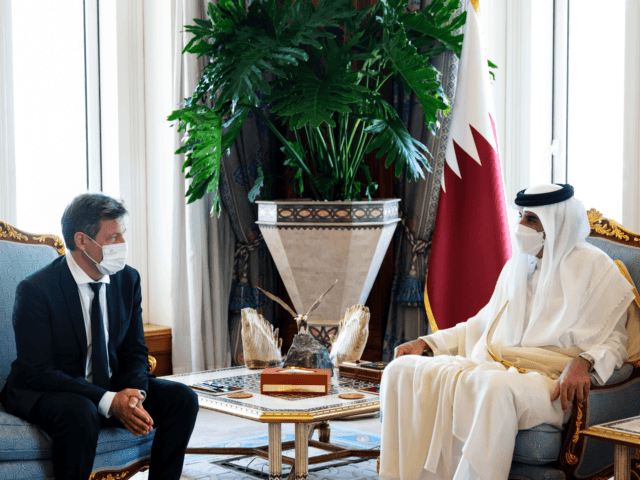In an apparent move of desperation, Germany has agreed to a gas deal with the Islamic kingdom of Qatar in order to ween itself off Russian energy.
On Sunday, Germany’s Economics Minister, Robert Habeck of the Green Party, announced from Doha that his country has reached a “long term energy partnership” with the Islamist nation of Qatar.
“Although we might still need Russian gas this year, in the future it won’t be so anymore. And this is only the start,” Habeck said, per German public broadcaster Deutsche Welle.
The Green politician said that Germany plans on transporting the liquid natural gas (LNG) from Qatar — which is one of the top three producers in the world — onboard ships rather than through pipelines.
However, this will require the construction of terminals at German docks to receive the gas. Habeck admitted that while his country has approved the construction of two such LNG terminals, they likely will not be operable until at least 2026 — meaning that it is unclear how much gas can actually be supplied to Germany by Qatar in the near future.
Though Germany has of late taken some belated steps against its dependence on Russian gas, for example by putting the kibosh on the Nord Stream 2 pipeline — at least for now — it has so far refused to enact a U.S.-style embargo on Russian gas.
Germany, which is dependent on Russia for about one-third of its natural gas, has been hard hit by the global surge in energy costs amid the war in Ukraine, with gasoline prices surging to €2.13 per litre ($8.92 per gallon) and €2.25 per litre ($9.43 per gallon) for diesel at the pump.
Yet the economic powerhouse of Europe — which has banned fracking domestically — has refused to back away from its “green” agenda and is still planning to phase out all of its nuclear reactors by next year.
People can be publicly executed for "crimes" including apostasy and sorcery under Islamic law in Saudi Arabia by medieval and even pre-medieval methods such as stoning, although the preferred method of execution is beheading with a scimitar https://t.co/KWnVu3nxTS
— Breitbart London (@BreitbartLondon) March 13, 2022
The liquid natural gas deal with Qatar has come under criticism for trading one authoritarian regime for another to meet its energy demands.
Indeed, while Qatar currently serves on the United Nations Human Rights Council (UNHRC), the Islamic kingdom has been long-chastised for its human rights record.
The Islamist state, where “Islam is official religion… and sharia a principal source of legislation,” according to the constitution, is ruled as a near-absolute monarchy by Sheik Tamim bin Hamad Al Thani, with political parties banned, elections highly restrive, and of minimal importance to the country’s governance.
Though Qatari citizens are some of the wealthiest in the world, due to the county’s large oil and gas reserves, the majority of the population is comprised of non-citizens who have effectively zero political rights and minimal civil liberties, according to Freedom House’s 2021 report on the country — which gave Qatar a score of 25 out of 100 on its Freedom Index.
The issue of human rights abuses against the non-citizens of Qatar drew international attention after the Islamic kingdom was awarded the right to host the 2022 FIFA World Cup.
According to a report from The Guardian newspaper last February, some 6,500 migrant workers from South-East Asian nations such as Bangladesh, India, Nepal, Pakistan, and Sri Lanka have died in Qatar over the past decade constructing World Cup stadiums and other venues in perilous conditions such as extreme heat — but some migrants are said to have died from “asphyxiation due to hanging”.
The report notes that the true death toll was likely much higher, given that figures from 2020 were not included and because the paper was unable to secure figures from other migrant origin countries including Kenya and the Philipines.
Mocking the deal with the Qataris, a satirical article in the German newspaper Die Welt facetiously proclaimed that “relief in Germany is huge. Finally, you are no longer dependent on gas supplies from an autocratically governed country, where homosexuals are oppressed and human rights are not always taken so seriously.”
BoJo Runs Damage Control as Head-Chopping Saudis Execute Three During Oil-Begging Visithttps://t.co/jBsMGiOxdZ
— Breitbart London (@BreitbartLondon) March 17, 2022
Follow Kurt Zindulka on Twitter here @KurtZindulka

COMMENTS
Please let us know if you're having issues with commenting.